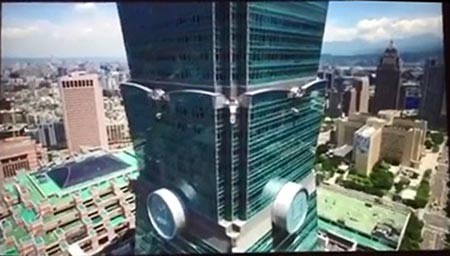A Chinese tourist whose unmanned aerial vehicle (UAV) crashed into the iconic Taipei 101 tower could face fines of up to NT$1.5 million ($48,000), the China Times reported on Thursday.
Yan Yungfan, a 30-year-old man from eastern China's Fujian Province, was supposedly attempting to film Taipei's cityscape on Tuesday morning with a remotely controlled Phantom 3 UAV when he lost control of the drone, causing it to hit the side of Taipei 101 at around the 30th floor.
No one was injured in the incident and only minor damage was sustained by the building's glass windows, but the video immediately became a viral sensation after it was uploaded online.
Yang, a software engineer who had previously studied at Taipei as an exchange student, paid a visit to a local police station on Wednesday. He was visiting Taiwan with his girlfriend and was supposed to fly back to China on July 30.
According to Taiwan's Civil Aeronautics Administration, Yang may have violated the country's Civil Aviation Act and stands to be fined NT$300,000 ($9,600) to NT$1.5 million ($48,000).
Taipei 101 said in a statement that there have been three incidents of drones crashing around the building since mid-June, with the first two cases taking place on June 15 and June 20. No injuries were reported for both incidents, although the UAV that crashed on June 15 fell less than two meters from pedestrians.
The crash elicited strong reactions from netizens, with many citing previous warnings from UAV enthusiasts not to fly near Taipei 101, the China Times said in its report.
Some also chastised the government for being slow in creating specific legislation for photography drones, warning that serious incident is bound to happen in the future.
There are even netizens speculating that terrorists could attack buildings by strapping a drone with explosives.
Taiwanese drone suppliers note that the UAVs being increasingly used for taking photographs are essentially remote control helicopters fitted with GPS and cameras.
Drone crashes are also becoming commonplace in mainland China, with the most recent case occurring on June 6 when a photography drone hit a raised subway line and caused a lengthy delay.
Another reported incident took place at the end of 2013, when a drone delayed 10 flights after drifting into the Beijing International Airport.




























